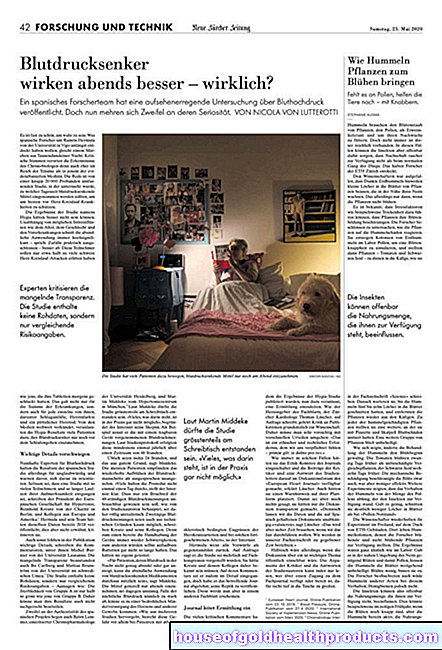Humans distinguish over a trillion smells
All content is checked by medical journalists.MunichThe sense of smell is often a step ahead of the eye. US researchers calculated that humans can differentiate between over a trillion smells. Up until now it was assumed that humans can only distinguish 10,000 olfactory notes.
Hundreds of scented cocktails
Scientists from Rockefeller University in New York recruited 26 subjects for their studies. They wanted to know how good the average healthy person's sense of smell really is. To do this, they mixed their test subjects three different scented cocktails from a pool of 128 fragrances such as orange, anise, vanilla or peppermint. Each mixture consisted of 10, 20 or 30 ingredients.
The trick: two of the three mixtures were exactly identical - so they smelled the same. Only one differed in some of its components. The test subjects should now sniff out which one it was. They repeated this test 264 times with each participant, each time with different smells.
"A trillion may be an understatement"
The evaluation showed that not all noses were equally good. But on average, the test subjects managed to differentiate mixtures if the ingredients matched 51 percent or less. If the similarities were greater, fewer and fewer participants could sniff out the difference.
The researchers then ran their data through a computer model and determined that theoretically humans can distinguish between over a trillion odors. The study authors write that this is even a conservative estimate. Because there are far more than the 128 tested fragrances in the environment that could be combined with one another in a wide variety of ways.
Just follow your nose
The sense of smell is of enormous importance not only for animals, but also for humans. It protects against the consumption of spoiled food, warns against smoke and fire or other potentially dangerous substances and also has a great influence on social life. While the signals picked up by the eyes and ears must first be processed in the cerebral cortex, scents in the brain have a direct effect on the limbic system. There emotions are processed and urges are directed.
Even the choice of partner is apparently dependent on the smell. Because the scent molecules of every single person are different. For example, they also contain information about the nature of the genetic make-up. Experiments with animals have shown that they often prefer a partner whose genetic makeup is as different as possible from their own. This ensures that the offspring are equipped with a wide range of different genes.
Source: C. Bushdid et al. Humans Can Discriminate More than 1 Trillion Olfactory Stimuli. Science. DOI: 10.1126 / science.1249168. 03/21/2014
Tags: interview anatomy toadstool poison plants





.jpg)























